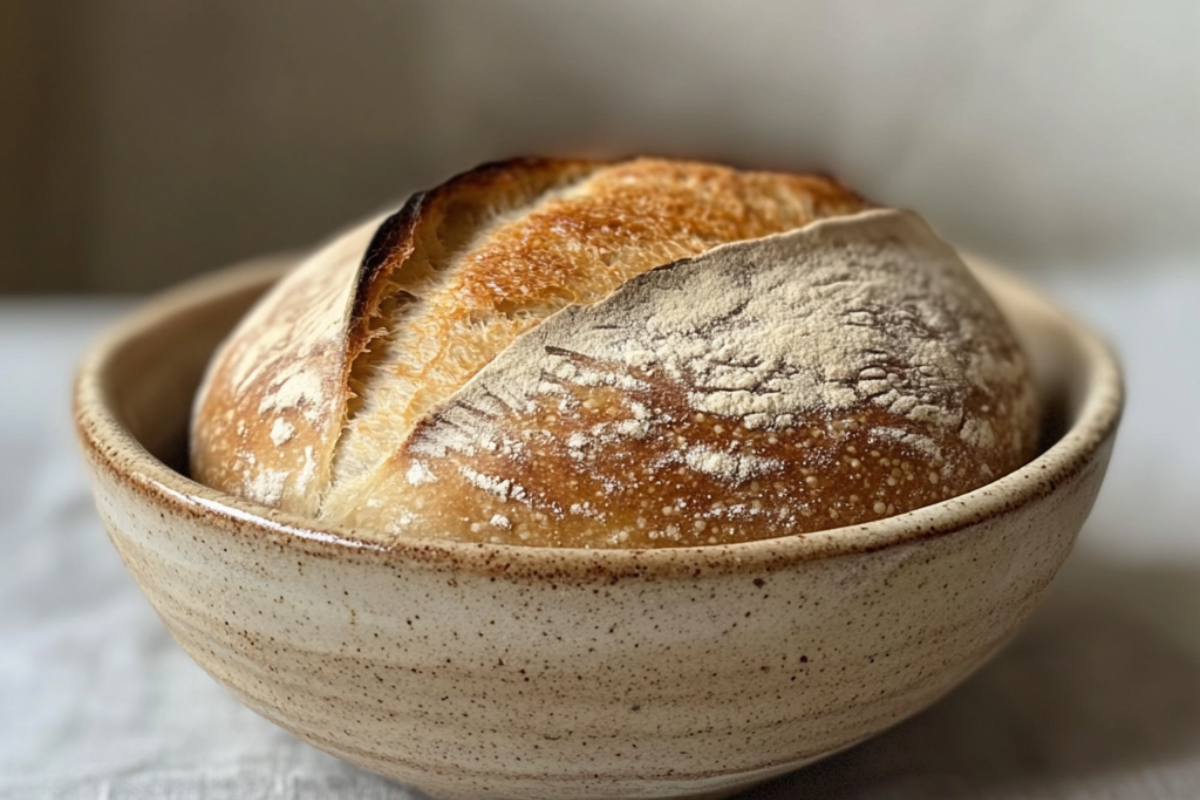Baking sourdough at home has become very popular. Many bakers ask: Do you need a unique bowl for sourdough? While you don’t always need a unique bowl, the right one can make a big difference in how your dough rises and ferments.
This article explores whether a special bowl is necessary, the types of bowls that work best, and other tools you may need, such as proofing baskets and containers for your starter.
Do You Need a Special Bowl for Sourdough?
A sourdough starter is a mix of flour and water that helps make bread rise. The bowl or container you use can affect how well your starter ferments. Choosing a suitable bowl can prevent unwanted reactions to the dough’s acidity. Materials like glass or ceramic are best because they don’t react with the dough.
Check out these sourdough discard recipes for more ideas on what to do with an extra starter.
The Best Bowls for Sourdough Baking: Glass, Plastic, and Metal Options
The bowl you use can affect how well your dough ferments. Bowls that keep a steady temperature, like glass or ceramic, work well for sourdough fermentation. If you use a container that ccan’thold the temperature, your dough might not rise as much.
For more tips on fermentation, check out this helpful guide to sourdough bread bowls.
How to Choose the Right Bowl for Sourdough Fermentation
There are several types of bowls you can use for sourdough baking, each with its pros and cons:
- Glass Bowls:
Glass is an excellent choice because it is non-reactive and lets you see the dough rise. - Plastic Bowls:
While plastic is lightweight and easy to clean, it may not hold temperature as well as glass or ceramic. - Metal Bowls:
Stainless steel bowls are non-reactive and safe for sourdough, but you should avoid aluminum, which can affect the ddough’sacidity. - Ceramic or Stoneware Bowls:
These bowls keep the dough warm but can be heavy and break easily.
Is a Proofing Basket Necessary for Perfect Sourdough?
A proofing basket, or banneton, helps shape the dough during the final rise. While unnecessary, using one can help create a better crust and shape. If you don’t have a banneton, a regular bowl lined with a cloth works, too.
Can You Use a Metal Bowl for Sourdough?
Stainless steel bowls are perfectly safe for sourdough because they don’t react with the dough. However, avoid using aluminium or other reactive metals, which may affect the fermentation flavours. Stainless Steel Bowls vs. Plastic Bowls: Which is Better for Sourdough?
Here is a quick comparison of glass and plastic bowls:
- Glass Bowls:
Glass is non-reactive, easy to clean, and allows you to see the dough rise. It’s great for bakers who want to monitor their dough closely. - Plastic Bowls:
Plastic bowls are lightweight and portable, but they ddon’thold heat as well as glass or ceramic. They can also absorb odours over time.
Best Practices for Using a Bowl for Sourdough Dough Rising
When using any bowl for sourdough, follow these best practices:
- Choose the Right Size: The bowl should be big enough to let the dough rise without spilling.
- Cover the Dough: Use a damp cloth or plastic wrap to keep the dough moist.
- Use Non-Reactive Materials: Avoid using aluminium or untreated metal bowls, which can affect the dough.
FAQs
- Do I need a unique bowl for sourdough?
You don’t need a unique bowl, but using a non-reactive one like glass, ceramic, or stainless steel will help your dough ferment better. - Can I use a metal bowl for sourdough?
Yes, as long as it’s stainless steel. Avoid reactive metals like aluminium. - Why isn’t my dough rising in a plastic bowl?
Plastic ddoesn’thold heat as well as glass or ceramic, which may slow fermentation. - The best container for storing sourdough starter?
Glass jars are best for long-term storage, but BPA-free plastic containers work for shorter periods.
Choosing the bowl for your sourdough is essential for optimal fermentation and rising. Glass, ceramic, and stainless steel bowls are ideal because they don’t react with the dough and help maintain a consistent temperature. Following these tips and choosing the right tools will make sourdough baking more accessible and successful.
For more sourdough ideas, try these sourdough discard recipes, which will help you make the most of your leftover starter.
